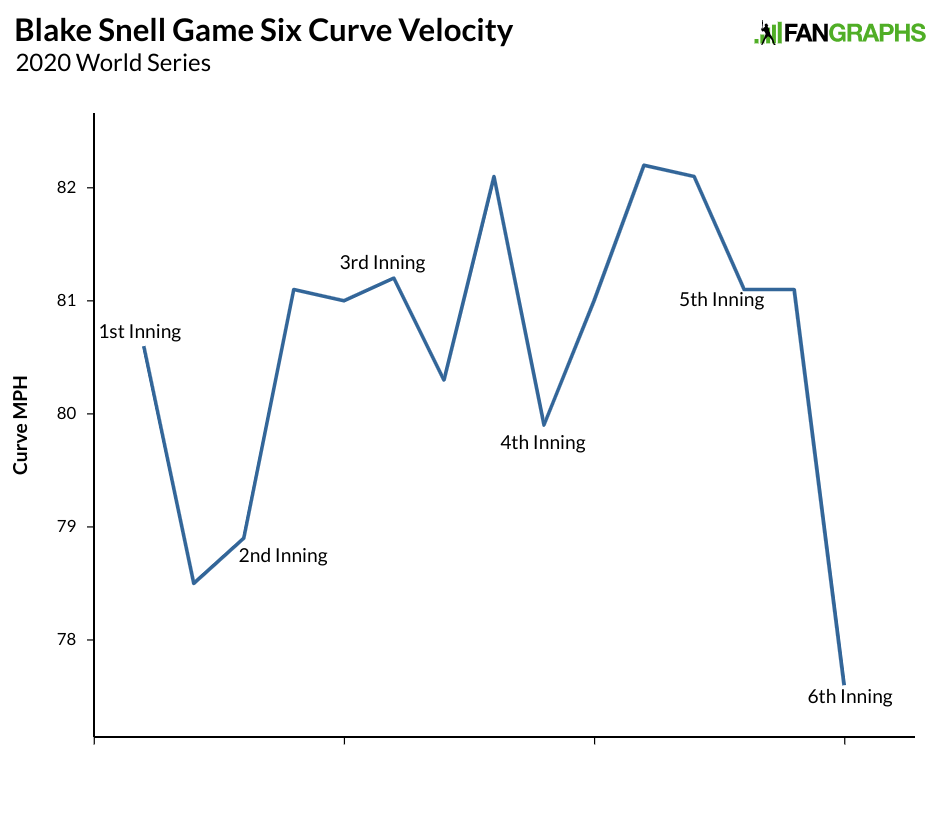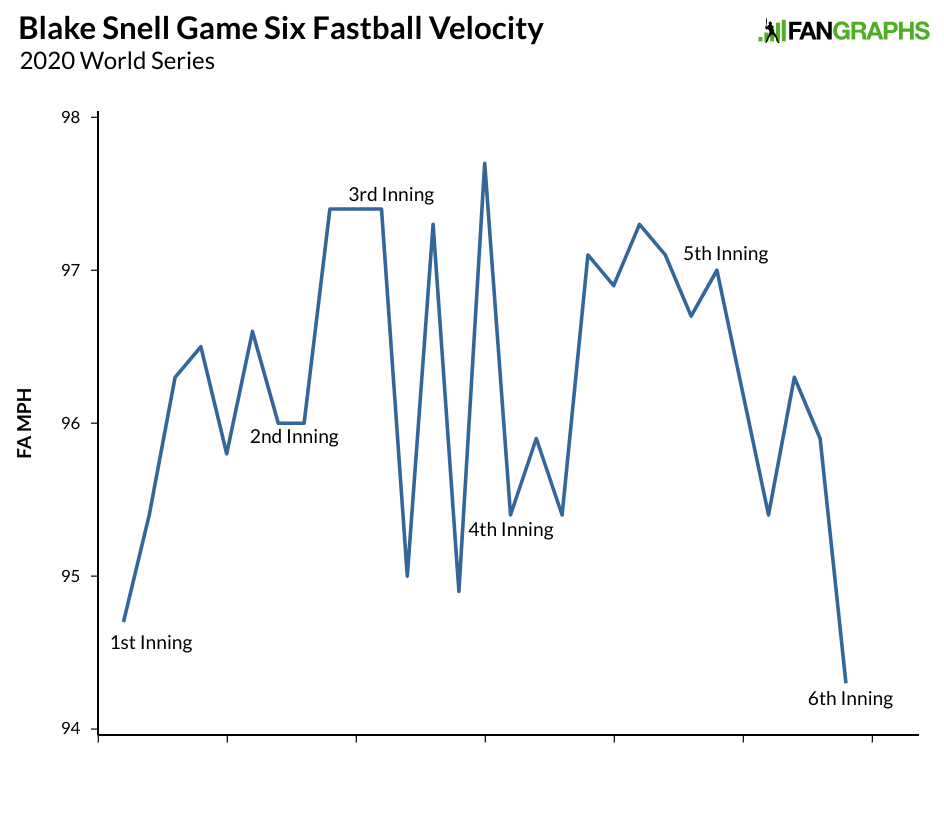Sometimes we allow hindsight to cloud our judgment and fall into a trap of second-guessing when assessing managerial decisions. That wasn’t much of an issue last night when discussing whether Kevin Cash should have removed Blake Snell in the sixth inning. That’s because the decision was universally derided as it was happening, just before the Rays blew their lead and the Dodgers won the World Series. As Rachael McDaniel noted:
The Dodgers’ powerful lineup, so productive in this World Series — the Dodgers, you may recall, had held a lead at some point in 27 consecutive innings prior to tonight — seemed utterly useless against Snell. Their fearsome top-of-the-lineup trio of Betts, Seager, and Turner were all 0-for-2 with two strikeouts against him through the first five innings; he was at a very reasonable 73 pitches on the night. Snell’s CSW% on all his pitches was an eye-popping 40%. In short, he looked fantastic. It’s hard to imagine a pitcher looking much better than Snell did for most of Game 6; it’s hard to imagine how the outcome might have differed had he stayed in the game.
Snell was pitching incredibly well up that point in the game, and there was considerable criticism of Cash’s decision as it seemed to be based on numbers, particularly the third time through the order (TTO) penalty, rather than actually paying attention to the feel of the game and just how good Snell was pitching. Cash specifically mentioned the TTO penalty in his postgame comments:
“The only motive was that the lineup the Dodgers feature is as potent as any team in the league,” Cash said. “I felt Blake had done his job and then some. Mookie [Betts] coming around the third time through, I value that. I totally respect and understand the questions that come with [the decision]. Blake gave us every opportunity to win. He was outstanding. These are not easy decisions. … I felt it was best after the guy got on base — Barnes hit the single — I didn’t want Mookie or [Corey] Seager seeing Blake a third time through.
If Cash’s decision had come purely from relying on Snell’s prior history the third time through the order and had ignored what was happening in the game, then the criticism would be justified. Cash did address this somewhat after the game:
“As much as people think that sometimes, there’s no set plan. This organization’s tremendous about giving the staff the trust to make in-game decisions to give us the best chance to win. I respect what unfolded today was pretty tough.”
The crowd coming down hard on Cash was both analytical and traditional in nature. Most believed that, considering how good Snell was pitching at the moment he was taken out, removing him from the game was a mistake, TTO penalty or no. The criticism assumes Cash was not watching the game, or at least ignored what was in front of his own eyes: an ace pitching like one on the way to forcing a Game 7. But it’s also possible that it was not Cash’s eyes that were betraying him, but our own. Snell’s brilliance through the first five innings does not guarantee success in the sixth. Those first five might have served to gloss over the first few batters in the sixth, even as Snell induced a weak popup and gave up a single to center field.
We don’t want to ignore what happened in the first five innings, but instead use those innings as a backdrop for Snell’s start to the sixth. We have just four pitches to go on, but there’s some indication that Snell was no longer his dominant self. Snell’s first pitch of the sixth inning was a curve. It’s the first pitch in this summary of the sixth inning:
The pitch was a 78 mph curveball over the middle of the plate. AJ Pollock didn’t put a good swing on it and it made for a quick and easy first out. Here’s Snell’s curveball velocity during the game.

Maybe that’s nothing. It’s just one pitch and Snell induced a popup, but it was 3 mph off of Snell’s average during the game. The first pitch to Austin Barnes was a 94 mph fastball up out of the strike zone. Here’s Snell’s fastball velocity by pitch in last night’s game.

Snell’s fastball to Barnes was 2 mph off his average on the day, and like with most pitchers, velocity matters a lot. When Snell’s fastball was at least 95 mph during the regular season, he induced whiffs on 13% of pitches, but when it was less than 95 mph, his whiff rate was just 9%. The actual results are more footnote than evidence, but there was a significant difference in results when Snell’s fastball loses a few ticks. That was even on display in last night’s game. Snell got four swings and misses on his seven hardest fastballs, and six on his hardest 13. But on the 16 pitches below 96.5 mph, he induced just two whiffs.
Much has been made of Mookie Betts, Corey Seager, and Justin Turner each striking out twice against Snell earlier in the game. On Betts’ strikeout in the third inning, he swung through a 98 mph fastball. It’s not clear that Snell still had that same stuff in the sixth. When Seager and Turner struck out in the fourth inning, they missed on big curves that topped 80 mph. It’s also not clear whether Snell still had that kind of stuff at that point in the game.
It was just two pitches to start the sixth inning, but after a changeup for a strike and a slider over the middle of the plate that Barnes hit for a single, Betts was coming to the plate against a pitcher who wasn’t quite what he was earlier in the game. Maybe a slightly off Snell was still better than Nick Anderson, but it wasn’t just the third time through the order penalty dictating whether Snell should leave the game. There was a little bit of evidence, however small, that he was tiring. It’s a manager’s job to take out the pitcher when he gets tired, and that’s what Cash did. It was a difficult choice, and perhaps not the right one, but it wasn’t made just from data. Watching Snell had to help confirm Cash’s decision was the right one to him at the time.
Read More


